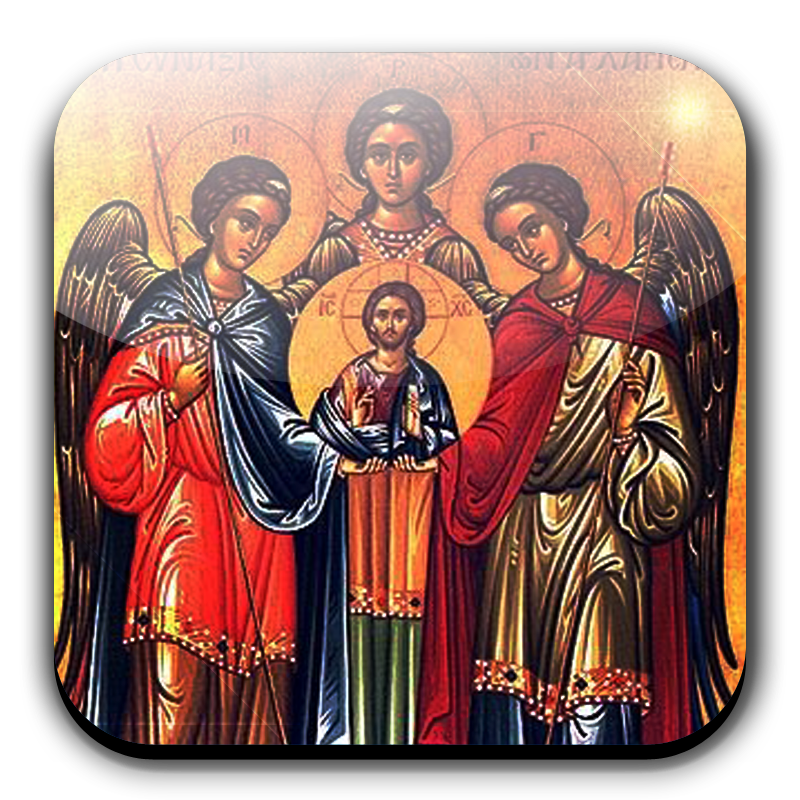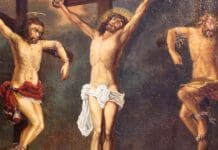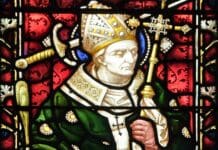Angels—messengers from God—appear frequently in Scripture, but only Michael, Gabriel and Raphael are named. The memorials of Gabriel (March 24) and Raphael (October 24) were added to the Roman calendar in 1921. The 1970 revision of the calendar joined their feasts to Michael’s.
Michael (meaning: Who Is Like To God?)
The name Michael signifies “Who is like to God?” and was the war cry of the God’s angels in the battle fought in heaven against satan and his followers. Holy Scripture describes Michael as one of the chief princes, and leader of the forces of heaven in their triumph over the powers of hell. He has been especially honoured and invoked as patron and protector by the Church from the time of the earliest Christians. Although he is called “the Archangel,” the Greek Fathers and many others place him over all the angels – as Prince of the Seraphim. Michael is the patron of grocers, mariners, paratroopers, police and sickness.
Michael’s name is recorded four times in Scripture:
- Daniel 10:13. Gabriel says to Daniel, when he asks God to permit the Jews to return to Jerusalem: “The Angel of the kingdom of the Persians resisted me . . . and, behold Michael, one of the chief princes, came to help me . . . and none is my helper in all these things, but Michael your prince”;
- Daniel 12, the Angel speaking of the end of the world and the Antichrist says: At that time shall Michael rise up, the great prince, who standeth for the children of thy people.
- The Epistle of St. Jude: When Michael the Archangel, disputing with the devil, contended about the body of Moses, St Jude alludes to an ancient Jewish tradition of a dispute between Michael and Satan over the body of Moses, an account of which is also found in the apocryphal book on the assumption of Moses (Origen, “De principiis”). St. Michael concealed the tomb of Moses; Satan, however, by disclosing it, tried to seduce the Jewish people to the sin of hero-worship. Michael also guards the body of Eve, according to the “Revelation of Moses”.
- Revelation 12:7, And there was a great battle in heaven, Michael and his angels fought with the dragon. St. John speaks of the great war at the end of time, which reflects also the battle in heaven at the beginning of time. According to the Fathers there is often question of St. Michael in Scripture where his name is not mentioned. They say he was the cherub who stood at the gate of paradise, “to keep the way of the tree of life” (Genesis iii, 24), the angel through whom God published the Decalogue to his chosen people, the angel who stood in the way against Balaam (Numbers 22:22), the angel who routed the army of Sennacherib (2 Kings 19:35).
Following these Scriptural passages, Christian tradition gives Michael four offices.
- To fight against Satan
- To rescue the souls of the faithful from the power of the enemy, especially at the hour of death.
- To be the champion of God’s people, the Jews in the Old Law, the Christians in the New Testament; therefore he was the patron of the Church, and of the orders of knights during the Middle Ages
- To call away from earth and bring men’s souls to judgment
Regarding his rank in the celestial hierarchy opinions vary; St. Basil and other Greek Fathers place Michael over all the angels, saying he is called archangel because he is the prince of the other angels. others believe he is the Prince of the Seraphim, the first of the nine angelic orders. But, according to Aquinas he is the prince of the last and lowest choir, the angels. The hymn of the Mozarabic Breviary places St. Michael even above the Twenty-four Elders.
Its natural to Michael the champion of the Jewish people, to be the champion also of Christians, giving victory in war to those who invoke him. The early Christians regarded some of the martyrs as their military patrons: Sts. George, Theodore, Demetrius, Sergius, etc.
In art Michael is represented as an angelic warrior, fully armed with helmet, sword, and shield (often the shield bears the Latin inscription: Quis ut Deus), standing over the dragon, whom he sometimes pierces with a lance. He also holds a pair of scales in which he weighs the souls of the departed, or the book of life to show that he takes part in the judgment. In the middle ages, his feast (29 September) was celebrated as a holy day of obligation, but along with several other feasts it was gradually abolished since the eighteenth century. Michaelmas Day, in England and other countries, is one of the regular quarter-days for settling rents and accounts; but it is no longer remarkable for the hospitality with which it was formerly celebrated.
Gabriel (meaning: The Power of God)
One of the three archangels mentioned in the Bible, only four appearances of Gabriel are recorded:
- Daniel viii, he explains the vision of the horned ram as portending the destruction of the Persian Empire by the Macedonian Alexander the Great, after whose death the kingdom will be divided up among his generals, from one of whom will spring Antiochus Epiphanes.
- In Chapter ix, after Daniel had prayed for Israel, we read that the man Gabriel . . . . flying swiftly touched me, and he communicated to him the mysterious prophecy of the “seventy weeks” of years which should elapse before the coming of Christ. In Chapter x, it is not clear whether the angel is Gabriel or not, but at any rate we may apply to him the marvellous description in verses 5 and 6.
- He foretells to Zachary the birth of the Precursor (Luke 1 v8ff)
- At the Annunciation – to Mary (Luke 1:26)
He is the angel of the Incarnation and of Consolation, and so in Christian tradition Gabriel is ever the angel of mercy. At the same time Gabriel is, as his name suggests, the angel of the Power or strength of God, and it is worth while noting the frequency with which such words as “great”, “might”, “power”, and “strength” occur in the passages referred to above. The Jews indeed seem to have dwelt particularly upon this feature in Gabriel’s character, regarding him as the angel of judgment. Thus they attribute to Gabriel the destruction of Sodom and of the host of Sennacherib, though they also regard him as the angel who buried Moses, and as the one deputed to mark the figure Tau on the foreheads of the elect (Ezech., 4). In later Jewish literature the names of angels were considered to have a peculiar efficacy, and the British Museum possesses some bowls inscribed with Hebrew, Aramaic, and Syriac incantations in which the names of Michael, Raphael, and Gabriel occur. These bowls were found at Hillah, the site of Babylon. In apocryphal Christian literature the same names occur, cf. Enoch, ix, and the Apocalypse of the Blessed Virgin.
Gabriel is mentioned only twice in the New Testament, but it is not unreasonable to suppose with Christian tradition that it is he who appeared to Joseph and to the shepherds, and also that it was Gabriel who strengthened Jesus in the garden.
Gabriel is generally termed only an archangel, but the expression used by Raphael, I am the angel Raphael, one of the seven, who stand before the Lord (Tobit xii, 15), and Gabriel’s own words, I am Gabriel, who stand before God (Luke 1, 19), have led some to think that these angels must belong to the highest rank. This is generally thought to mean their rank as the highest of God’s messengers, and not as placing them among the Seraphim and Cherubim.
Raphael (meaning: God has healed)
Raphael’s name doesn’t appear in the Hebrew Scriptures, and in the Septuagint only in the Book of Tobias. Here he first appears disguised in human form as the travelling companion of the younger Tobias, calling himself Azarias the son of the great Ananias. The story of the adventurous journey during which the protective influence of the angel is shown in many ways including the binding “in the desert of upper Egypt”, of the demon who had previously slain seven husbands of Sara, daughter of Raguel, is graphically related in Tobit 5-11. After the return and the healing of the blindness of the elder Tobias, Azarias makes himself known as the angel Raphael, one of the seven, who stand before the Lord (Tobit xii, 15. Cf. Apoc., viii, 2). Of these seven archangels who appear in the angelology of post-Exilic Judaism, only three, Gabriel, Michael and Raphael, are mentioned in the canonical Scriptures. The others, according to the Book of Enoch (cf. xxi) are Uriel, Raguel, Sariel, and Jerahmeel, while from other apocryphal sources we get the variant names Izidkiel, Hanael, and Kepharel instead of the last three in the other list.
Regarding the functions attributed to Raphael we have little more than his declaration to Tobias (Tobit 12) that when the latter was occupied in his works of mercy and charity, Raphael offered his prayer to the Lord, that he was sent by the Lord to heal him of his blindness and to deliver Sara, his son’s wife, from the devil.
The Jewish category of the archangels is recognized in the New Testament (I Thess., iv, 16; Jude, 9), but only Gabriel and Michael are mentioned by name. Many scholars however, identify Raphael with the “angel of the Lord” mentioned in John 5. This assumption is based both on the significance of the name, and on the healing role attributed to Raphael in the Book of Tobias.
It is widely thought that Raphael is the angel in John 5:1-4, at the pool called Bethzatha, where the multitude of the infirm lay awaiting the moving of the water. The blind, the lame and the paralyzed were waiting for an angel of the Lord who, descended at certain times into the pond; and the water was moved. And he that went down first into the pond after the motion of the water was made whole of whatsoever infirmity he lay under.


















I just want to thank you all.
It’s perfect time to make a few plans for the long run and it’s time to be happy. I’ve learn this publish and if I may I desire to suggest you some interesting issues or suggestions. Maybe you can write next articles regarding this article. I want to read more issues about it!
Litany of Saint Raphael the Archangel:
Lord, have mercy on us. Lord, have mercy on us.
Lord, have mercy on us. Christ have mercy on us.
Christ, have mercy on us. Christ, have mercy on us.
Christ hear us. Christ, graciously hear us.
God the Father of Heaven, Have mercy on us.
God the Son, Redeemer of the world, Have mercy on us.
God the Holy Spirit, Have mercy on us.
Holy Trinity, One God, Have mercy on us.
Holy Mary, Queen of Angels, pray for us.
St. Raphael, pray for us.
St. Raphael, filled with the mercy of God, pray for us.
St. Raphael, perfect adorer of the Divine Word, pray for us.
St. Raphael, terror of demons, pray for us.
St. Raphael, exterminator of vices, pray for us.
St. Raphael, health of the sick, pray for us.
St. Raphael, our refuge in all our trials, pray for us.
St. Raphael, guide of travelers, pray for us.
St. Raphael, consoler of prisoners, pray for us.
St. Raphael, joy of the sorrowful, pray for us.
St. Raphael, filled with zeal for the salvation of souls, pray for us.
St. Raphael, whose name means “God heals,” pray for us.
St. Raphael, lover of chastity, pray for us.
St. Raphael, scourge of demons, pray for us.
St. Raphael, in pestilence, famine and war, pray for us.
St. Raphael, angel of peace and prosperity, pray for us.
St. Raphael, endowed with the grace of healing, pray for us.
St. Raphael, sure guide in the paths of virtue and sanctification, pray for us.
St. Raphael, help of all those who implore your assistance, pray for us.
St. Raphael, who was the guide and consolation of Tobias on his journey, pray for us.
St. Raphael, whom the Scriptures praise: “Raphael, the holy angel of the Lord, was sent to cure,” pray for us.
St. Raphael, our advocate, pray for us.
Lamb of God, Who takes away the sins of the world, Spare us, O Lord.
Lamb of God, Who takes away the sins of the world, Graciously hear us, O Lord.
Lamb of God, Who takes away the sins of the world, Have mercy on us.
Christ, hear us. Christ, graciously hear us.
Pray for us, St. Raphael, to the Lord Our God, That we may be made worthy of the promises of Christ.
Lord, Jesus Christ, by the prayer of the Archangel Raphael, grant us the grace to avoid all sin and to persevere in every good work until we reach our heavenly destination,
You Who lives and reigns world without end. Amen.